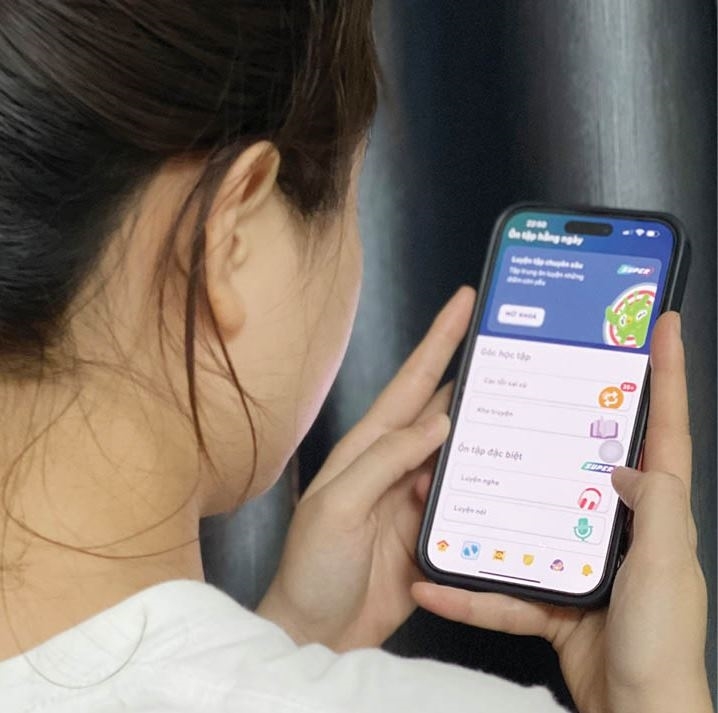    |
 |
| With just a smartphone, young people can easily learn a foreign language through apps |
Just a few minutes needed
It was my weakness in foreign languages that the moment my friend Huynh Cong Danh introduced me to the Duolingo app and said, “It's free. You only have to spend a few minutes each day, whenever you want. Even if you forget, the app will remind you. It’s a win-win,” I got curious and decided to download the app for learning.
After the basic test, I started out by choosing the most basic knowledge to learn. Learning this way felt more like a way to relax, as the app was designed with challenges to overcome. The app gently encourages users when there are mistakes in exercises, along with specific instructions. Also, it will send an email reminder if the learner is lazy.
Living in an era of international integration and increasingly fierce job competition, second languages have become the key to opening up more job opportunities for young people. To save costs and have more flexibility in arranging time, many young people turn to free foreign language learning apps.
In addition to Duolingo, there are many other foreign language learning apps that young people search and choose, including Memrise, TFlat, Cake, LingoDeer, or Busuu... The highlight is that these apps help learners practice all language skills including listening, speaking, reading, and writing with an easy learning method: “learning while playing, playing while learning”.
    |
 |
| Learning languages with Duolingo |
Huynh Thi Anh Tuyet, an English learner through apps, found them to be quite convenient. Each exercise on the app is designed with multiple skills, ranging from basic to advanced levels to meet the learner's abilities. With just a few minutes each day, learners can complete 1-2 exercises or more. When there are mistakes, the app will remind the learner to remember and correct the errors.
“At first, I tried it out of curiosity, but then I became addicted. Interestingly, these apps are not like in-class learning at all. They help create habits and a sense of proactiveness through reminders and praise, which encourage the learners. Some exercises have 17 questions, and if done quickly, it only takes 2-3 minutes; so, it's easy to arrange the time,” said Ms. Tuyet.
From these initial experiences, many young people have built the habit of learning English every day through these apps. Doan Nhu, a young doctor, shared: “Every morning I wake up and study for 5–10 minutes before going to work, then, studying a few more minutes during lunch breaks, and also in the evening. The app keeps track of the days I study. I've been learning English this way for a few months now."
Forming groups to “study together”
Learning a foreign language through apps requires self-motivation and self-discipline as no one is checking or forcing you to learn. This is both an advantage and a disadvantage, as some young people might be too lazy to study on their own. However, to overcome this, many have formed groups to learn English together through apps to "compete" and remind each other to study.
Cong Danh shared that besides the challenges, positive learning attitude will be shown through rewards on the app such as diamond symbols. If you study well, you will be promoted and participate in bronze, silver, gold or higher competitions. Study groups can showcase their achievements on the app, compare each other's study levels, and help each other to “progress together”.
According to Anh Tuyet, upon accepting an invitation to join a study group and seeing her friends’enthusiasm, even challenging herself when promoted due to diligent studying, she felt the need to strive harder. With English learning apps, as the study time can be very short and easy to arrange, one can improve their foreign language skills by “cramming” whenever they have time.
Many young people, when starting to learn a foreign language through apps, only intend to learn for showing off. Some of them quickly regress when they are not in control of self-study. However, a considerable number are extremely interested and becoming increasingly attracted. The language learning groups created by groups of friends have helped each other make efforts to read, speak, understand more about the cultures of other countries, and most importantly, improve their foreign language shortcomings.